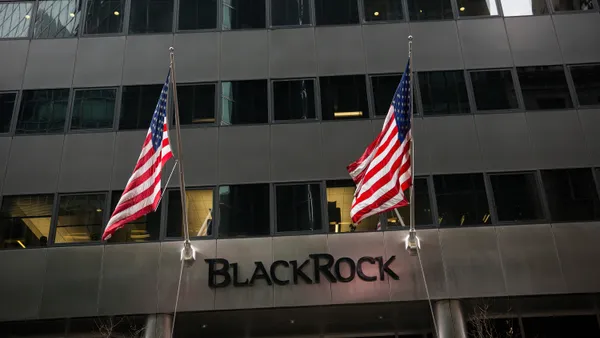Dive Brief:
- An analysis of 430 sustainable passive funds by Paris-based climate nonprofit Reclaim Finance found that 70% were helping expand the fossil fuel industry.
- The report is based on data from Morningstar, covered $2.7 trillion in assets and looked at funds sold by BlackRock, Amundi, UBS AM, Deutsche Bank subsidiary DWS and Legal & General Investment Management.
- “Misleading sustainability claims should be a wake-up call for institutional investors who are in danger of being implicated in organized greenwashing, and for regulators who must play their part in protecting investors from misleading information,” the report said.
Dive Insight:
While analyzing 25 of the most high-profile sustainable funds, Reclaim Finance found that the majority were investing in fossil fuel developers, including ExxonMobil and Shell. The nonprofit noted that when these funds are invested in bonds, they offer direct financing for fossil fuel developers.
From the five major asset managers surveyed, Amundi had the highest share of sustainable passive funds that were exposed to fossil fuel expansion at 78%, while BlackRock’s sustainable passive funds had exposure upwards of 70%.
Funds such as BlackRock’s iShares MSCI USA ESG Enhanced UCITS ETF, which, according to the nation’s largest asset manager, “integrate[s] ESG information into its investment process to optimize exposure to issuers to achieve a higher ESG rating and reduce exposure to carbon emissions,” includes exposure to a bevy of fossil fuel developers. Reclaim Finance’s research concluded that, of the $12.2 billion assets analyzed from the fund, $220 million were exposed to fossil fuel companies including Schlumberger, NextEra Energy, The Williams Companies, Kinder Morgan, and Air Products and Chemicals.
The lack of a standardized methodology in measuring ESG compliance of passive funds is a challenge, according to the report. Reclaim Finance’s analysis of the methodologies behind the indices making sustainability claims found that none addressed the presence of fossil fuel companies in the index.
The lack of a uniform methodology has long been an issue, according to experts, with concern around lofty ESG goals being paired alongside commitments to deliver shareholder returns.
“ESG funds are based on unregulated ESG ratings. ESG ratings, in turn, are built on comparative rankings of industry peers not on universal standards,” a 2022 Harvard Business Review article on ESG investing noted. “This is why fossil fuel companies can have better ESG ratings than makers of electric vehicles.”
Absent a standardized formula for measuring ESG compliance, investors may need to do more of their own research, suggests Alexandra Mihailescu Cichon, chief commercial officer at ESG data science firm RepRisk.
“Voluntary self-disclosures, which make up the bulk of ESG credentials used to build ESG Fund portfolios, are inherently flawed," Cichon told ESG Dive over email. “Today’s investor must be less reliant on ESG credentials and act as their own arbitrator of what justifies a true ESG investment by considering risk and business conduct.”
However, Boston-based global law firm Ropes & Gray argued that the methodology Reclaim Finance’s researchers used is based on a “flawed” assumption that fossil fuel companies should be excluded in passive funds labeled as “sustainable.”
“The authors treat any fund with ‘ESG’ or a similar term in its name as a ‘sustainable’ fund, and then simply assume that holding securities of a company engaged in exploring for oil, gas or coal is necessarily contrary to the use of that name,” partners Amy Roy and Robert Skinner wrote in a March 26 blog post. “This logical leap ignores the fact that ESG-denominated passive funds track an underlying ESG index with a defined methodology. These fully disclosed methodologies may or may not involve strict screening out of fossil fuel companies.”











